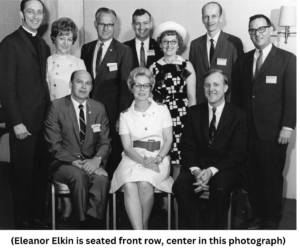This handwritten speech is from 1974 presented by Eleanor Elkin, Chairman of the “NARC Residential Services and Facilities Committee” at the 3rd Congress of the Caribbean Association on Mental Retardation. [Note: The exact words and language of the speech from 49 years ago have been transcribed below. Handwritten speech by Eleanor Elkin.]
 Alternatives To Institutions
Alternatives To Institutions
Presented by Eleanor S. Elkin, Chairman, NARC Residential Services and Facilities Committee at the Third Congress of the Caribbean Association on Mental Retardation
October 19 – 23, 1974, Bridgetown, Barbados
The preparation of this paper was a challenge which was approached with a sense of humility. Our goals – to help people who are mentally retarded to grow, develop, and live a good life – are the same, but our problems are different.
You do not need to initiate programs to change institutions and to overcome dehumanization of residents which has been the result of years of living in a large institution. Too often the inappropriate structure, the overcrowding, the understaffing and meager programs of our residential facilities have caused many staff persons and some parents to become institutionalized in their attitudes and really believe that nothing can be done. Of course, this becomes a self-fulfilling prophesy and nothing progressive is done.
You do not need to plan extensive and expensive deinstitutionalization programs.
You do not need to fight the self-perpetuating interests of administration, labor, civil service, and commerce surrounding an institution. A big institution is big business for a small town.
We hope you have learned from us what not to do. We hope you will not copy our mistakes. We hope you will learn with us what can be done. There is so much we, at this Congress, can share to help each other. The National Association for Retarded Citizens, in the U.S.A., has published “The Right To Choose” which you may find helpful. Much of what I saw you will find in this book.
The International League of Societies for the Mentally Handicapped and the United Nations’ Declaration of Rights of Mentally Retarded Persons states, “Whenever possible the mentally retarded person should live with his own family or a foster family. The family with which he live should receive assistance… Before moving a child from the family every effort should be made to maintain the home
Ed Skarnulis, who is responsible for residential facilities in the community in Nebraska, has had several years’ experience establishing group homes, hostels, apartments and foster homes. He believes these residences are good, but he keeps telling us it is better to support people in their homes than build, buy or rent places for them.
So, the first thing we must do, when considering placement away from home, is ask “What is needed to keep this child or adult at home?” What is it that is making it so difficult for the rest of the family? Perhaps a daily visit by the Public Health Nurse to give a bath will relieve the mother of the chore that was breaking her back or spirit. Maybe provision of laundry or diaper service will make the difference. A positioning chair, a wheelchair or lifting device may be necessary to help the handicapped person or their family. Or to have a separate vacation. Short term homes can also provide intensive behavior changing or other program help. Supplemental income so the mother does not have to work and can care for her handicapped child should be available.
If needs cannot be met at home, then a residential service must be found which will promote the individual’s growth and dignity. It should provide a home environment with supervision as needed.
It should afford living experiences appropriate to the functioning level and learning needs of the individual.
This residence should be located in the mainstream of community life and provide access to program services to meet the individual’s developmental needs.
The basic principles which underly a nation’s cultural value system and legal guarantees should apply equally to its mentally retarded citizens. Residential services, therefore, must be developed using these principles.
-
- Retarded children and adults have the same rights as other children and adults.
- Retarded children and adults are capable of learning and development. Each individual has potential for progress, no matter how severely handicapped.
- Retarded individuals should be helped to live as normal a life as possible. Daily routines, lifestyle, and physical environment should be as near to the cultural pattern as possible.
- Retarded individuals should be treated so as to promote emotional development. They must not be treated as children all their lives because they do not have the opportunity to learn adult behaviors.
- All programs for mentally retarded persons must contribute to increasing the complexity of the individual’s behavior, the ability of the individual to control his environment and the self-control of the individual. Programs must maximize these qualities which have been culturally designated as normal and which enhance a person’s human qualities.
- Program objectives should be designed to meet the needs of each individual and will vary for different degrees of impairments. The goal is to significantly heighten his personal, social, and vocational development.
- The individual’s personal goals should be given consideration when designing programs. Contrary to some opinions, most retarded persons are capable of communicating their desires and aspirations for the future. Of course, the individual, as well as the family, should participate in planning a change of residence.
- The community is the focal point for delivering service to citizens. Therefore, community services, such as education, recreation, rehabilitation, health, and mental health should be used to the fullest extent. The aim must be integration. Segregating services must not be set up when generic services are available.
Residential placement must be viewed as a part of an individual’s total program and not a place to put somebody.
There can be as many different kinds of residences as there are needs for living arrangements away from the natural home. Foster homes for 1 or 2 children is perhaps the most desirable and “normal” arrangement. (It is important for foster parents to have good consultation available to strengthen their home.) Temporary homes for emergency, respite or vacation were discussed briefly. Homes that provide learning experiences and support to enable a person to move to independence; apartments that can allow semi-independent (that is just a minimum of supervision) or independent living group homes for children who need developmental help so they can live with some success in the natural or foster home; 5-day homes for children who live far from the school they must attend; residences for the elderly are examples of homes that some communities have established with success.
People often ask about the design of a residential facility for retarded persons. We agree with the rule-of-thumb put forward by Arnold Gagnes, Chairman of the Architecture Committee of the International League. Is it a home like the other homes in the neighborhood? Would you want to live there?
It is important to have the support of the community. Therefore, government, business, centers of influence, citizen interests, parents should be included in this planning group. They should also be included in the advisory committee as the facility develops.
It has been said that small residential facilities can be just as dehumanizing as a large institution. This is true but it is must easier to see abuses in the house down the street, especially if we look. Provision for regular monitoring and evaluation should be included in the plan of operation. Programs and environments can be evaluated according to the degree to which they meet the needs of each individual they serve. You should ask “What is happening to Mary? Has she moved forward because of this program?”
Many communities are setting up advocacy services. Usually, the advocates are volunteers. They are people who care about people. They interact on a one-to-one basis with handicapped persons offering support in social and emotional areas. Advocates help their protegees obtain their rights and when necessary, protect them from abuse and exploitation.
Yes, we are our brothers’ keeper but not keeper in the sense of custodian keeper, in the sense of advocate and friend. Wise and kind people have put a sign on a door of a facility for mutli-handicapped children. It reads – “Caution – Human being inside. Handle with care!” As they accomplish their goals the sign should be changed to read “Caution – human beings inside – coming out!”
